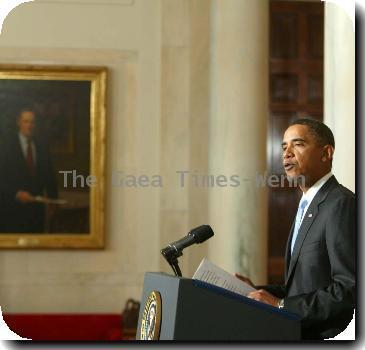Afghan president visits town of Marjah just seized from Taliban, hears complaints from elders
By Heidi Vogt, APSunday, March 7, 2010
Afghan president visits town seized from Taliban
MARJAH, Afghanistan — Afghan President Hamid Karzai heard a litany of complaints Sunday from residents of Marjah, the town in the south that thousands of U.S., NATO and Afghan troops just seized from the Taliban.
“Today, I’m hear to listen to you and hear your problems,” Karzai told about 300 elders in a mosque in the central part of the town.
The elders didn’t hold back.
They complained — sometimes shouting — about corruption among former Afghan government officials. They lamented how schools in Marjah were turned into military posts by international forces. They said shops were looted during the military offensive, and alleged that innocent civilians were detained by international forces.
Karzai’s high-profile visit with NATO commander Gen. Stanley McChrystal was part of NATO’s new counterinsurgency strategy in Afghanistan, which aims to rout insurgents from population centers, set up a credible and effective civilian government and rush in aid.
The government’s task in Marjah is to convince residents of the town in Helmand province that the civilian government can provide them with a better life than the Taliban, which were routed during a three-week offensive. Marjah is the first major test of the NATO counterinsurgency strategy since President Barack Obama ordered 30,000 new American troops to try to reverse the Taliban’s momentum.
In a message to The Associated Press, Taliban spokesman Yasouf Ahmadi said insurgents fired mortars into Marjah’s main intersection, but reporters traveling with Karzai and McChrystal did not witness any attack.
Karzai flew to Marjah and met the elders near the town’s main bazaar. McChrystal joined him on the floor of the mosque, but did not speak during the nearly two-hour meeting.
The elders expressed outrage over house searches conducted by the military, and civilian casualties that occurred during the offensive. They told Karzai they want Afghan troops — not international forces or local policemen — searching houses. The elders — some gesturing to express their frustration — also said they wanted clinics and schools, and were losing patience with the central government’s inability to provide services.
The president, who has been dubbed “the mayor of Kabul” by critics who claim his authority doesn’t extend beyond the capital, said the central government intends to be more responsive to the people’s needs.
“Are you against me or with me?” Karzai asked the elders. “Are you going to support me?”
The elders all raised their hands and shouted: “We are with you. We are supporting you.”
Karzai promised to provide them security, open schools and start building roads and clinics.
Marjah residents have heard promises from the central government before. International and Afghan forces have taken over Marjah at least three times before. In the past, local governments that were set up failed to deliver on commitments to build clinics and schools. Marjah residents told the AP last month that the former police force sent in 2009 was so corrupt that locals rose up and drove them out — even before the Taliban returned.
Karzai told reporters he was not surprised that the people in Marjah were angry. Marjah has been “abandoned,” he said. Karzai said he was glad to have the chance to talk with residents who have suffered at the hands of the Afghan government and foreign forces.
They “told me of their problems with sincerity and clarity,” Karzai said. “Inshaallah (God willing), we will try to solve your problems. The promises that we have made of security and reconstruction, we will fulfill them.”
It was unclear whether Karzai or McChrystal discussed a controversy surrounding the newly appointed civilian administrator of Marjah, Abdul Zahir. Government authorities are investigating reports that Zahir, tasked with representing a new, credible government in the former Taliban stronghold, served part of a more than four-year prison sentence in Germany for stabbing his son in 1998.
While Karzai and McChrystal were in the south, fighting raged for a second day in northeastern Afghanistan.
Gunbattles between the Taliban and another Islamist faction left at least 50 fighters dead in Baghlan province as militants apparently fought over control of several villages where the government has almost no presence, officials said Sunday.
Fierce clashes were continuing Sunday, with militants using heavy machine guns and rocket-propelled grenades, the provincial governor said.
Local police official Zalmai Mangal said the battles appeared to be a power struggle between local Taliban forces and the Hezb-e-Islami militia loyal to warlord Gulbuddin Hekmatyar.
Violent clashes between anti-government Islamist factions are rare, although various militias have their own agendas and power struggles are relatively common.
Mangal, the province’s deputy police chief, said reports from the area indicate that at least 50 militant fighters were dead, 35 from Hezb-e-Islami and 15 from the Taliban. It was unclear how many total militants were involved, he said by telephone.
Police had not yet entered the area of the clashes as of midday Sunday, but were standing by with mobile hospitals to help any wounded, he said.
It was unclear what touched off the fighting, Mangal said. However, he said that Taliban fighters reportedly had moved into villages that traditionally were controlled by Hezb-e-Islami.
Provincial Gov. Mohammad Akbar Barakzai said the fighting centered around five to six villages west of Baghlan-e-Jadid district in the central part of the province.
“We don’t know yet about casualties among civilians or damage to civilian houses,” he said.
It was not immediately clear whether the clashes were a localized dispute or represented signs of a rift between Islamist insurgent groups that fight Karzai’s government and international forces in the country.
Associated Press Writer Rahim Faiez in Kabul contributed to this report.
Tags: Afghanistan, As-afghanistan, Asia, Barack Obama, Central Asia, High, Islamism, Kabul, Marjah, Municipal Governments




